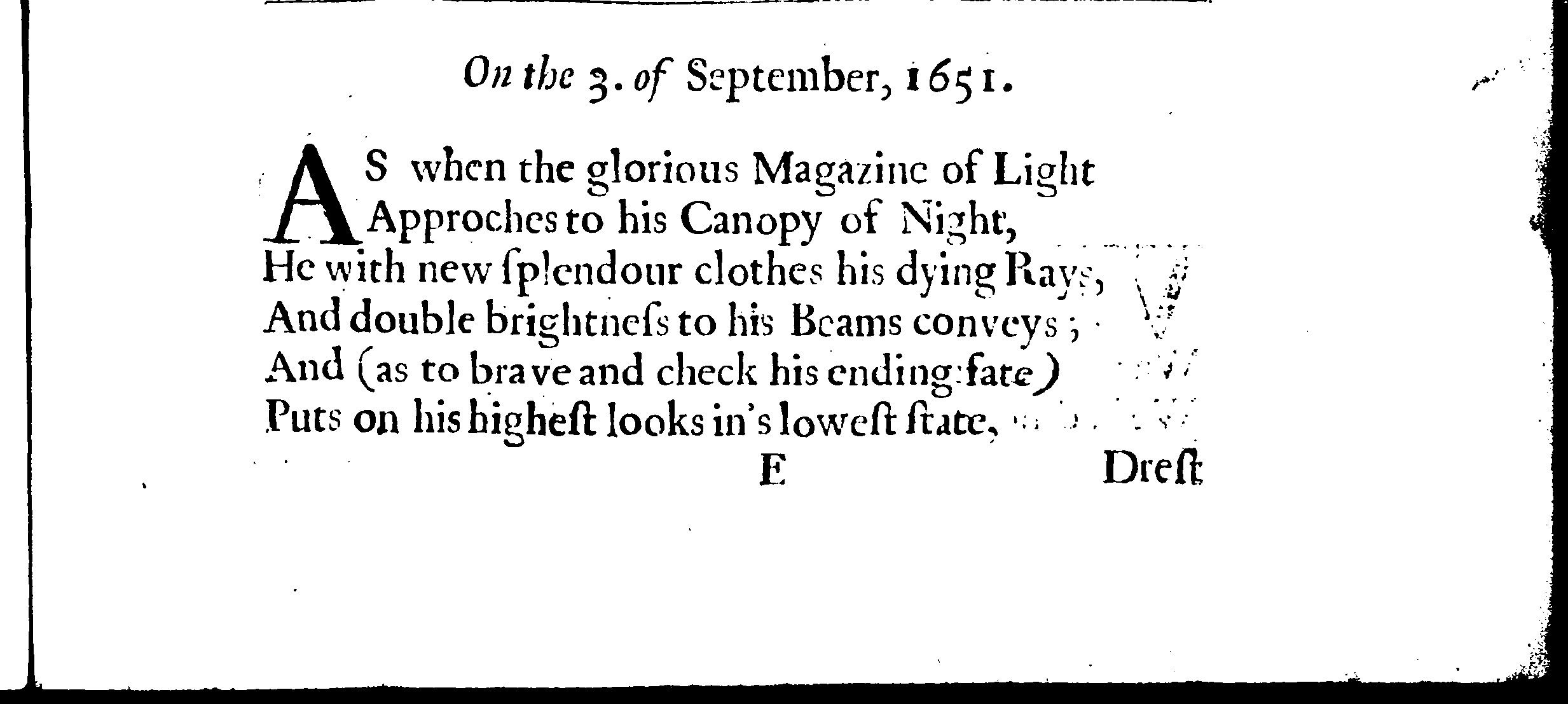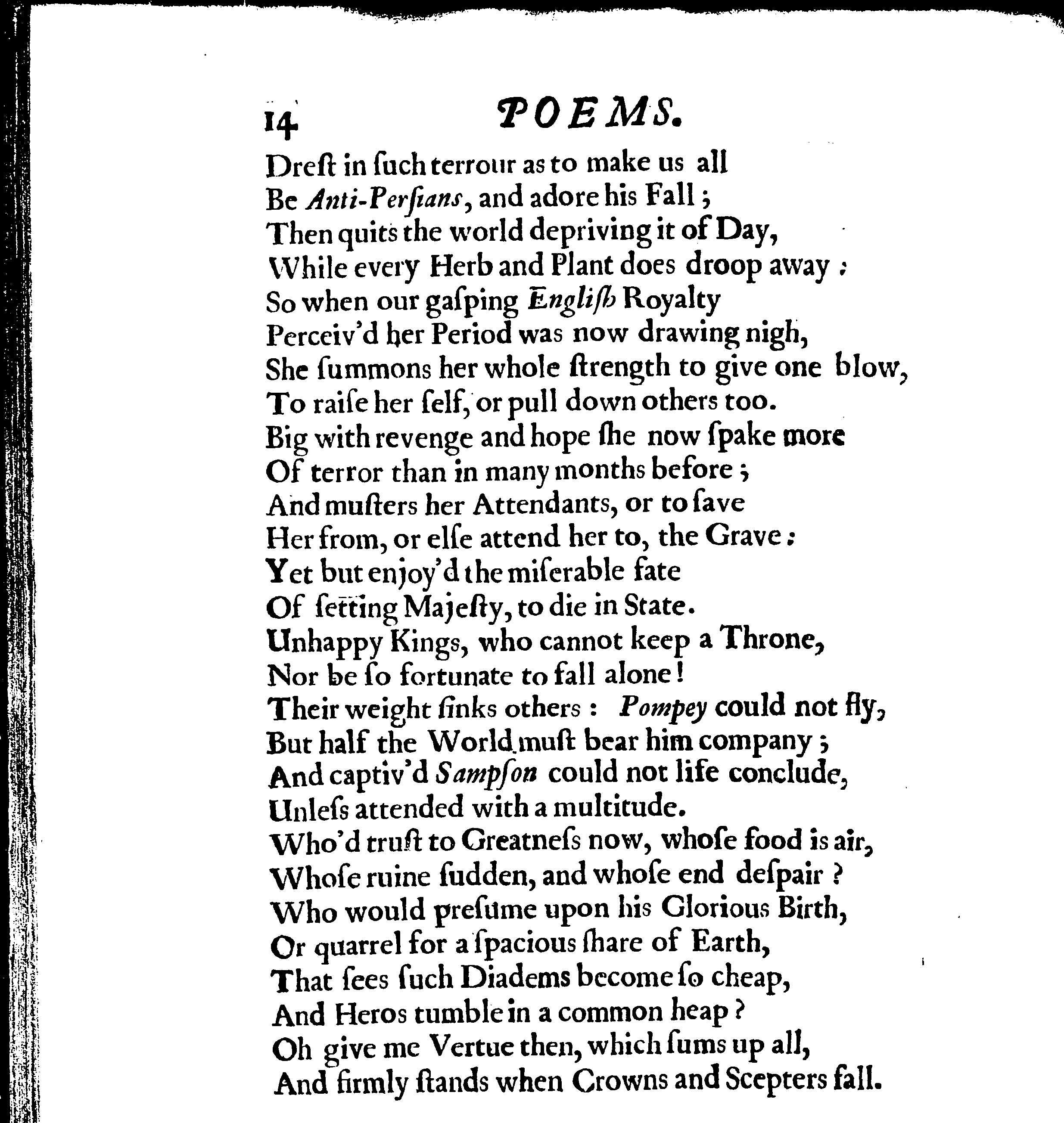"On the 3. of September, 1651"
By
Philips Katherine
Transcription, correction, editorial commentary, and markup by Staff and Research Assistants at The University of Virginia, John O'Brien, Sara Brunstetter, Rachel Retica
13
On the 3. of September, 1651SeptemberSeptemberOn September 3rd, 1651, Oliver Cromwell and his men
defeated Charles II and the Royalists in the battle of Worcester, the last
major battle of the English Civil War.
1As when the glorious MagazineMagazineMagazineA storehouse
or repository. In military use, a storeroom for arms and explosives
(Oxford English Dictionary). of Light
2Approches to his Canopy of Night
3He with the new splendour clothes his dying Rays,
4And double brightness to his Beams conveys;
5And (as to braveBraveBrave To defy (Oxford English
Dictionary). and checkCheckCheckto stop sharply (Oxford
English Dictionary) his ending fate)
6Puts on his highest look in's lowest state,
14
7Drest in such terrour as to make us all
8Be Anti-PersiansAnti-PersiansAnti-PersiansPersians had the reputation of being
sun-worshippers. Anti-Persians, therefore, would be anti-sun, depicted
here as though they were rooting for it to set (Encyclopedia Britannica).
and adore his Fall;
9Then quits the world depriving it of Day,
10While Every Herb and Plant does droop away:
11So when our gasping English Royalty
12Perceiv'd her PeriodPeriodPeriodAn end, a conclusion; the point of
completion of a process (OED). was now drawing nigh,
13She summons her whole strength to give one blow,
14To raise her self, or pull down others too.
15Big with revenge and hope she now spake more
16Of terror than in many months before;
17And musters her Attendants, or to save
18Her from, or else attend her to, the Grave:
19Yet but enjoy'd the miserable fate
20Of setting Majesty, to die in State.
21Unhappy Kings, who cannot keep a Throne,
22Nor be so fortunate to fall alone!
23Their weight sinks others: Pompey could not flyPompey,PompeyPompey, a Roman statesman and general,
was a popular figure in literature for his spectacular fall from power.
After Caesar defeated him in the Battle of Pharsalus, concluding the
civil war, Pompey fled to Egypt, where he was assassinated by Lucius
Septimius, his former colleague.
24But half the World must bear him company;
25And captiv'd SampsonSampsonSampsonIn the Bible, Sampson ("man of the sun"), a Judge of
the ancient Israelites and blessed with superhuman strength, was taken
captive and tortured by the Philistines after Delilah betrayed him. He
took his revenge during a well-attended sacrifice, when he was summoned
to give a performance and instead destroyed the temple's columns,
killing himself and all of the Philistines within. could not life
conclude,
26Unless attended with a multitude.
27Who'd trust to greatness now, whose
food is airnAir,nAirWho survives on
nothing or who has false hope.
28Whose ruine sudden, and whose end despair?
29Who would presume upon his Glorious Birth,
30Or quarrel for a spacious share of Earth
31That sees such DiademsDiademsDiademsCrowns (Oxford
English Dictionary). become so cheap,
32And Heros tumble in a common heap?
33Oh give me Vertue then, which sums up all,
34And firmly stands when Crowns and Scepters fall.

